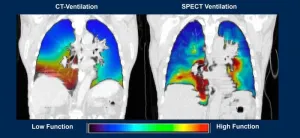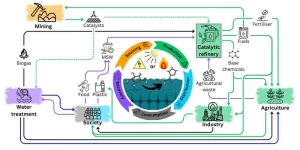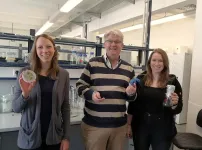(Press-News.org) Results from new study suggests that long-term exposure to air pollution leads to increased risk in dementia in Denmark.
"We also find association with noise, but this seems to be explained by air pollution primarily. Our study is in line with growing international knowledge on this topic." says Professor at Section of Environmental Health Zorana Jovanovic Andersen.
This is an important finding which adds that air pollution, beyond well-known effects on respiratory and cardiovascular system, also has major impacts on our brain, promoting inflammation in the brain, accelerating cognitive decline, and increasing risk of dementia.
"This is the first study in Denmark showing a link between air pollution and dementia. Although air pollution levels in Denmark have been declining and are relatively low, compared of the rest of Europe and world, this study shows that there are still significant and concerning health effects that demand more action and policies towards reduction of air pollution. As we are going to live longer, and more and more people will be diagnosed with dementia, this finding is important as it offer an opportunity to prevent new dementia cases, and ensure more healthy aging, by cleaning up the air we breathe," says Zorana Jovanovic Andersen.
An internationally unique study
The study followed a cohort of nurses for 27 years, from 1993 until 2020.
“This is internationally unique and necessary in regards of the development of dementia which can take many years. Second, the air pollution was estimated for each participant for a total of 41 years (from 1979 until 2020), which is also incredible. Third, we had extensive details about participant’s lifestyle and socio-economics and all our result take them in consideration. The novelty of this study is the very detailed and accurate data that we used,” says Research Assistant from Section of Environmental Health Stéphane Tuffier.
“Nurses with higher physical activity had a lower risk of dementia when exposed to air pollution compared to nurses with less physical activity. This indicates that physical activity might mitigate the adverse effects of air pollution on cognitive decline and risk of dementia,” Tuffier says.
END
Study suggests that air pollution promotes inflammation in the brain, accelerating cognitive decline and increasing risk of dementia
This is the first study in Denmark showing a link between air pollution and dementia. "The novelty of this study is the very detailed and accurate data that we use," says researcher behind the study.
2024-05-17
ELSE PRESS RELEASES FROM THIS DATE:
New imaging software improves lung diagnosis for 30% of patients who can't tolerate contrast dye; has added diagnostic benefits for all patients
2024-05-17
Southfield, Mich., May 17, 2024 – For up to 30% of patients who are allergic to medical contrast dye or have a dye restriction because of other health conditions, they might find that it takes longer to get a diagnosis when it comes to life-threatening lung issues such as pulmonary embolism. That's because imaging methods that detect lung problems but don't use contrast dye aren't as accurate and can be more time-consuming to administer.
Now, new imaging software, developed by pulmonologist Girish Nair, M.D., with Corewell Health William Beaumont University Hospital in Royal Oak, Michigan, and biomedical ...
A trial HIV vaccine triggered elusive and essential antibodies in humans
2024-05-17
DURHAM, N.C. – An HIV vaccine candidate developed at the Duke Human Vaccine Institute triggered low levels of an elusive type of broadly neutralizing HIV antibodies among a small group of people enrolled in a 2019 clinical trial.
The finding, reported May 17 in the journal Cell, not only provides proof that a vaccine can elicit these antibodies to fight diverse strains of HIV, but that it can also initiate the process within weeks, setting in motion an essential immune response.
The vaccine candidate targets an area on the HIV-1 outer envelope called the membrane proximal external region (MPER), which ...
Can we revolutionise the chemical industry and create a circular economy? Yes, with the help of catalysts
2024-05-17
The chemical industry is a cornerstone of global development, driving innovation, and providing essential products that support our modern way of life.
However, its reliance on unsustainable fossil resources has posed significant threats to global ecosystems through climate change and chemical pollution.
A new commentary published in Cell Press’ OneEarth co-authored by Griffith University researchers puts forth a transformative solution: catalysis to leverage sustainable waste resources, ushering the industry from a linear to a circular economy.
“If ...
Rutgers researchers identify impacts of Russia-Ukraine war on hospitals
2024-05-17
Rutgers researchers, aided by international collaborators, have tracked the devastation war has made on Ukraine’s hospital system.
Hundreds of hospitals in Ukraine have been forced to close or operate at a reduced capacity since Russia’s invasion of the Eastern European country in February 2022. Damage, destruction and supply shortages caused by the war have impaired the nation’s hospital system and taken a serious toll on human health.
In a study published in JAMA, Rutgers researchers and collaborators from the United States, Pakistan and Ukraine collected and compared data on hospital services provided both during ...
Differing values of nature can still lead to joined up goals for sustainability
2024-05-17
Recognising and respecting the different ways nature is valued can enable better environmental decision-making, according to new research led by the University of East Anglia (UEA).
International agreements such as the Sustainable Development Goals represent wide support for a sustainable future, living within planetary boundaries and ensuring a safer future for current and next generations.
However, there remain huge disagreements about how to advance such goals, often resulting in marginalisation, conflict and inaction.
The paper, published in the journal One Earth, ...
Ultraprocessed food consumption and cardiometabolic risk factors in children
2024-05-17
About The Study: The findings of this study suggest that high ultraprocessed food (UPF) consumption in young children is associated with adiposity and other cardiometabolic risk factors, highlighting the need for public health initiatives to promote the replacement of UPFs with unprocessed or minimally processed foods.
Corresponding Author: To contact the corresponding author, Nancy Babio, Ph.D., email nancy.babio@urv.cat.
To access the embargoed study: Visit our For The Media website at this link https://media.jamanetwork.com/
(doi:10.1001/jamanetworkopen.2024.11852)
Editor’s ...
Link between e-cigarette use and early age of asthma onset in US adults found through UTHealth Houston research
2024-05-17
A significant link between the use of electronic cigarettes and earlier age of asthma onset in U.S. adults was reported by UTHealth Houston researchers May 17, 2024 in the Journal of the American Medical Association (JAMA) Network Open.
Led by first author Adriana Pérez, PhD, MS, professor of biostatistics and data science at UTHealth Houston School of Public Health, the research found that adults who were asthma-free at the beginning of the study and reported e-cigarette use in the past 30 days increased their risk of developing earlier age of asthma onset by 252%.
“While previous studies have reported that e-cigarette use increases ...
UNC Greensboro researcher approved for NCInnovation grant funding for lithium refining research
2024-05-17
UNC Greensboro researcher Hemali Rathnayake, Ph.D., has been approved for grant funding from NCInnovation to continue her work in developing a cost-effective and efficient lithium refining process for converting lithium into battery-grade lithium carbonate.
The grant approval is conditioned on standard next steps, including executed grant agreements and formal notification to government partners. This funding is part of NCInnovation’s larger mission to unlock the innovative potential of North Carolina’s world-class universities.
“From ...
Plants restrict use of “Tipp-Ex proteins”
2024-05-17
Plants have special corrective molecules at their disposal that can make retrospective modifications to copies of genes. However, it would appear that these “Tipp-Ex proteins” do not have permission to work in all areas of the cell, only being used in chloroplasts and mitochondria. A study by the University of Bonn has now explained why this is the case. It suggests that the correction mechanism would otherwise modify copies that have nothing wrong with them, with fatal consequences for the cell. The findings have now been ...
New AI tool to help beat brain tumors
2024-05-17
A new AI tool to more quickly and accurately classify brain tumours has been developed by researchers at The Australian National University (ANU).
According to Dr Danh-Tai Hoang, precision in diagnosing and categorising tumours is crucial for effective patient treatment.
“The current gold standard for identifying different kinds of brain tumours is DNA methylation-based profiling,” Dr Hoang said.
“DNA methylation acts like a switch to control gene activity, and ...
LAST 30 PRESS RELEASES:
Kidney cancer study finds belzutifan plus pembrolizumab post-surgery helps patients at high risk for relapse stay cancer-free longer
Alkali cation effects in electrochemical carbon dioxide reduction
Test platforms for charging wireless cars now fit on a bench
$3 million NIH grant funds national study of Medicare Advantage’s benefit expansion into social supports
Amplified Sciences achieves CAP accreditation for cutting-edge diagnostic lab
Fred Hutch announces 12 recipients of the annual Harold M. Weintraub Graduate Student Award
Native forest litter helps rebuild soil life in post-mining landscapes
Mountain soils in arid regions may emit more greenhouse gas as climate shifts, new study finds
Pairing biochar with other soil amendments could unlock stronger gains in soil health
Why do we get a skip in our step when we’re happy? Thank dopamine
UC Irvine scientists uncover cellular mechanism behind muscle repair
Platform to map living brain noninvasively takes next big step
Stress-testing the Cascadia Subduction Zone reveals variability that could impact how earthquakes spread
We may be underestimating the true carbon cost of northern wildfires
Blood test predicts which bladder cancer patients may safely skip surgery
Kennesaw State's Vijay Anand honored as National Academy of Inventors Senior Member
Recovery from whaling reveals the role of age in Humpback reproduction
Can the canny tick help prevent disease like MS and cancer?
Newcomer children show lower rates of emergency department use for non‑urgent conditions, study finds
Cognitive and neuropsychiatric function in former American football players
From trash to climate tech: rubber gloves find new life as carbon capturers materials
A step towards needed treatments for hantaviruses in new molecular map
Boys are more motivated, while girls are more compassionate?
Study identifies opposing roles for IL6 and IL6R in long-term mortality
AI accurately spots medical disorder from privacy-conscious hand images
Transient Pauli blocking for broadband ultrafast optical switching
Political polarization can spur CO2 emissions, stymie climate action
Researchers develop new strategy for improving inverted perovskite solar cells
Yes! The role of YAP and CTGF as potential therapeutic targets for preventing severe liver disease
Pancreatic cancer may begin hiding from the immune system earlier than we thought
[Press-News.org] Study suggests that air pollution promotes inflammation in the brain, accelerating cognitive decline and increasing risk of dementiaThis is the first study in Denmark showing a link between air pollution and dementia. "The novelty of this study is the very detailed and accurate data that we use," says researcher behind the study.






